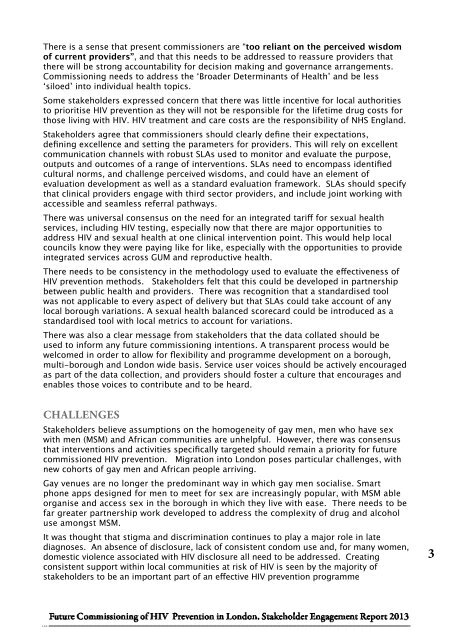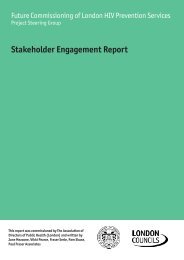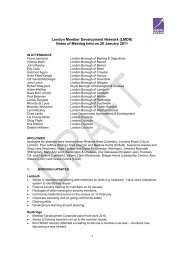Stakeholder Engagement Report - London Councils
Stakeholder Engagement Report - London Councils
Stakeholder Engagement Report - London Councils
Create successful ePaper yourself
Turn your PDF publications into a flip-book with our unique Google optimized e-Paper software.
There is a sense that present commissioners are “too reliant on the perceived wisdom<br />
of current providers”, and that this needs to be addressed to reassure providers that<br />
there will be strong accountability for decision making and governance arrangements.<br />
Commissioning needs to address the ‘Broader Determinants of Health’ and be less<br />
‘siloed’ into individual health topics.<br />
Some stakeholders expressed concern that there was little incentive for local authorities<br />
to prioritise HIV prevention as they will not be responsible for the lifetime drug costs for<br />
those living with HIV. HIV treatment and care costs are the responsibility of NHS England.<br />
<strong>Stakeholder</strong>s agree that commissioners should clearly define their expectations,<br />
defining excellence and setting the parameters for providers. This will rely on excellent<br />
communication channels with robust SLAs used to monitor and evaluate the purpose,<br />
outputs and outcomes of a range of interventions. SLAs need to encompass identified<br />
cultural norms, and challenge perceived wisdoms, and could have an element of<br />
evaluation development as well as a standard evaluation framework. SLAs should specify<br />
that clinical providers engage with third sector providers, and include joint working with<br />
accessible and seamless referral pathways.<br />
There was universal consensus on the need for an integrated tariff for sexual health<br />
services, including HIV testing, especially now that there are major opportunities to<br />
address HIV and sexual health at one clinical intervention point. This would help local<br />
councils know they were paying like for like, especially with the opportunities to provide<br />
integrated services across GUM and reproductive health.<br />
There needs to be consistency in the methodology used to evaluate the effectiveness of<br />
HIV prevention methods. <strong>Stakeholder</strong>s felt that this could be developed in partnership<br />
between public health and providers. There was recognition that a standardised tool<br />
was not applicable to every aspect of delivery but that SLAs could take account of any<br />
local borough variations. A sexual health balanced scorecard could be introduced as a<br />
standardised tool with local metrics to account for variations.<br />
There was also a clear message from stakeholders that the data collated should be<br />
used to inform any future commissioning intentions. A transparent process would be<br />
welcomed in order to allow for flexibility and programme development on a borough,<br />
multi-borough and <strong>London</strong> wide basis. Service user voices should be actively encouraged<br />
as part of the data collection, and providers should foster a culture that encourages and<br />
enables those voices to contribute and to be heard.<br />
Challenges<br />
<strong>Stakeholder</strong>s believe assumptions on the homogeneity of gay men, men who have sex<br />
with men (MSM) and African communities are unhelpful. However, there was consensus<br />
that interventions and activities specifically targeted should remain a priority for future<br />
commissioned HIV prevention. Migration into <strong>London</strong> poses particular challenges, with<br />
new cohorts of gay men and African people arriving.<br />
Gay venues are no longer the predominant way in which gay men socialise. Smart<br />
phone apps designed for men to meet for sex are increasingly popular, with MSM able<br />
organise and access sex in the borough in which they live with ease. There needs to be<br />
far greater partnership work developed to address the complexity of drug and alcohol<br />
use amongst MSM.<br />
It was thought that stigma and discrimination continues to play a major role in late<br />
diagnoses. An absence of disclosure, lack of consistent condom use and, for many women,<br />
domestic violence associated with HIV disclosure all need to be addressed. Creating<br />
consistent support within local communities at risk of HIV is seen by the majority of<br />
stakeholders to be an important part of an effective HIV prevention programme<br />
3




